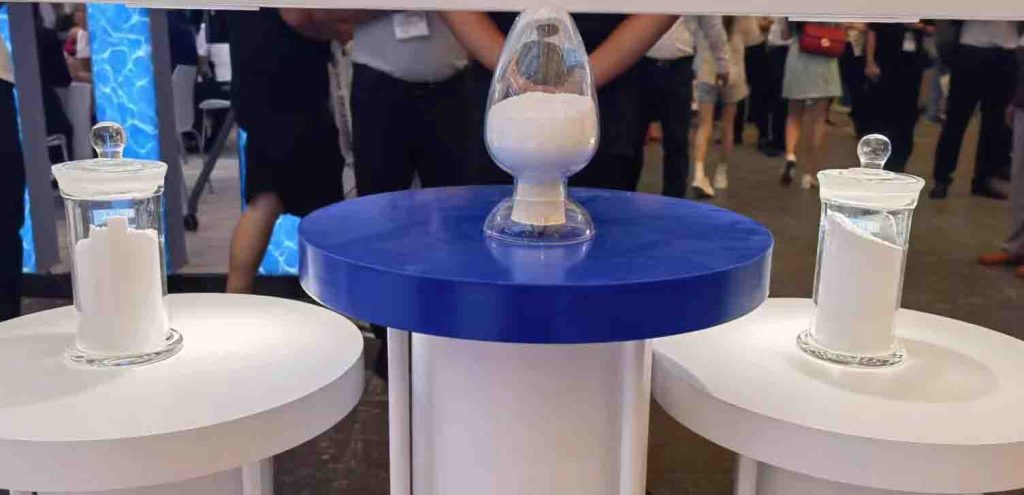Thickening Agent
Definition of Thickening Agent
A thickening agent is a substance or element that is introduced slowly to a liquid or solution to increase its viscosity or thickness. Thickening agents may limit flow and provide a more stable texture because of the increased interaction between molecules in the liquid or solution.
Thickening agents are essential in influencing the texture, look, and performance of various commodities in order to give them the necessary thickness and consistency in behavior, which enhances the usability of the completed item.
Organophilic clay is clay that has underwent chemical alteration to make it friendly with organic molecules. These clays from Zhejiang Camp-Shinning are created by combining natural clays, including bentonite, with surfactants or other chemicals.
Zhejiang Camp-Shinning technique modifies the surface properties of organoclay particles, facilitating their interaction and dispersion in organic solvents or non-polar liquids.
What are the Different Types of Thickening Agents as Rheology Modifiers?
There are various thickening agents, also called rheology modifiers, that have distinct characteristics and advantages that are helpful for particular uses. When you’re choosing a thickening agent, it is better to contact Zhejiang Camp-Shinning as there are a few things you should think about.
When formulating a product, factors such as the thickness you want, how long you want it to last, whether it will work well with other ingredients, and what the final product will be used for are all important considerations.
Bentonite Clay / Organophilic Clay
Natural type of clay that has a special characteristic of expanding when it gets wet. Organophilic clay is a special kind of bentonite clay that has been modified chemically to effectively interact with organic substances. Bentonite clay and organophilic clay are frequently utilized in various industries such as paints, coatings, and drilling fluids to alter the flow and consistency of materials.
These additives are really helpful in improving the suspension and flow properties of the systems they are added to. This is because they have impressive thixotropic properties.
Polyurethanes
Man-made substances that can help change the flow properties of materials and make them thicker. These substances are used in many different industries, such as paints, adhesives, and personal care products. Polyurethanes are great for controlling the thickness of a substance and can improve how stable and smoothly it flows.
PVA Monomers
These are synthetic polymers that dissolve in water and are used to modify the flow properties and increase the thickness of substances. Adhesives, coatings, and personal care products often contain them. Polyvinyl alcohol monomers have the ability to make solutions thicker, which helps to keep them stable and control how they flow..
Cellulosics
Methylcellulose and hydroxyethylcellulose are derived from cellulose, which is a natural material. Companies often use rheology modifiers and thickening agents in personal care products, pharmaceuticals, and food items. Cellulosics are good at holding onto water and can be used to adjust the thickness of a product. This gives you the ability to control how the product moves and feels.
Sulfonates
These compounds are capable of altering the flow properties of substances and can increase their viscosity. People often use these substances in industrial settings, like when they need drilling fluids or want to add something to concrete. Sulfonates can alter the thickness and movement properties of substances, resulting in increased stability and effectiveness.
Organosilicones
Silicone-based polymers are substances that can be used to modify the flow properties of materials and make them thicker. People often use these substances in things like personal care products, paints, and adhesives. Organosilicones are really useful because they can handle high temperatures and have a quality called shear-thinning.
This means that they become less thick when they are under pressure. In addition, formulations can be given a unique texture and sensation.
What is the Best Thickening Agent?
When you need to decide which thickening agent to use, it really depends on what you need it for and how you plan to use it. Organoclay and bentonite clay are becoming increasingly popular as paint thickening agents in different industries due to their versatility and effectiveness.
Organoclay is a great thickening agent because it has a unique ability to change its viscosity when it is stirred or shaken. This is called thixotropic behavior. Thixotropy is a characteristic of certain materials that causes them to become less thick or more runny when they are subjected to stress or pressure. Once the stress is removed, the material returns to its original thickness or viscosity.
Organoclay has the ability to become thick and stable once the shear forces are removed, but it can also flow easily during application or mixing. This is because it exhibits thixotropic characteristics. This behavior improves the stability, suspension, and resistance to sagging of formulations.
Is Bentonite an Organic Thickening Agent?
No, actually, bentonite is an inorganic substance that is commonly used as a thickening agent. Bentonite is a type of clay mineral that occurs naturally and is composed mainly of montmorillonite, which is a type of silicate that is layered. Over time, volcanic ash undergoes weathering and forms this substance.
It is a commonly used as a natural thickening agent, but it cannot be considered organic because it is not obtained from living organisms or organic matter. This substance is based on minerals. Although bentonite is not typically used in organic products, it can still be incorporated into formulations that strive to meet organic standards, as long as the entire formulation satisfies the specific organic certification criteria.
It’s important to keep in mind that when looking for organic options to use as thickening agents, you should consider the needs and requirements of the products that will be using organoclay. If you’re not sure whether Zhejiang Camp-Shinning’s bentonite organoclay is suitable for your product, please feel free to contact us by phone or through our website.
Typical Properties Organophilic Thickening Clay Agent
Best Paint Thickening Agent
Organoclay from Zhejiang Camp-Shinning has undergone chemical modifications to enhance its compatibility with organic thickening agent for acrylic paint formulas. When we want to change the behavior of clay particles, we add organic compounds that modify the surface of the particles. This process improves the mixing of the particles with the paint components.
Organoclay is a really good substance to use as a paint thickener agent because it can show thixotropic behavior, which is a big benefit. Thixotropy is a property of some materials that causes them to become less thick or more fluid when they are under stress, but they return to their original thickness when the stress is removed. Organoclay is a type of substance that has the ability to increase the thixotropic properties of paint.
This implies that the application or mixing of the paint will be simpler as it will have a smoother flow. When the paint is left undisturbed, the organoclay will make it thicker and more stable. By following this method, you can ensure that the brush moves effortlessly, the paint doesn’t drip, and it adheres better to the surface. All of these factors contribute to a final look that is more uniform and visually appealing.
Also, if you use organoclay in paint formulas, it can prevent pigments and fillers from settling because of its great suspension properties. When you use Zhejiang Camp Shinning’s organoclay, it helps to evenly distribute the paint particles. This results in better color consistency and reduces the settling of particles when the paint is stored. It is also an effective substance to thicken paint due to its compatibility with various binders and solvents.
Best Cosmetic Thickening Agent
Organoclay from Zhejiang Camp-Shinning has been chemically modified to make it more compatible with organic substances that are often used in cosmetics. To improve the effectiveness of cosmetic ingredients, we modify clay particles by adding organic compounds. This changes the surface properties of the particles and allows them to disperse and interact better.
Organoclay is a great cosmetic thickening agent because it has the ability to give thixotropic behavior, which is a really important advantage. Thixotropy is a characteristic of certain materials where they become less thick or more fluid when they are subjected to stress, and then return to their original thickness or viscosity once the stress is no longer present.
Organoclay helps cosmetic products to spread smoothly when applied or mixed, and then thickens and stabilizes them rapidly once the mixing or application stops. This behavior helps the product to spread evenly, prevents excess product from running off, and makes it easier for the product to stick to the skin or hair.
Additionally, organoclay offers excellent suspension properties, preventing the settling of pigments, particles, and other additives in cosmetic formulations. This helps maintain an even distribution of ingredients throughout the product, resulting in improved color consistency, stability, and texture.
Is Gelling Agent Same with Thickening Agent?
When we talk about a thickening agent, we mean a substance that makes a liquid or solution thicker or more viscous. The way it operates is by increasing the resistance to flow, which results in a thicker texture. Many industries, such as cosmetics, paints, and food, often use thickening agents.
However, when we talk about a gelling agent, we are referring to a substance that has the ability to turn a liquid into a gel or semi-solid form. Gelling agents can form a gel-like structure by creating a network within a liquid that traps and immobilizes the liquid in a three-dimensional form. Usually, gels are thicker and have a more solid consistency when compared to liquids.
It’s important to keep in mind that certain substances can function a gel thickening agent, depending on the concentration and specific conditions. Some clays, like bentonite, can work as both thickening and gelling agents. Slurry thickening agents also fall into this category. When you mix organoclays with a liquid, they can absorb the liquid and become gel-like, which makes the mixture thicker and more viscous.
When it comes to oil-based systems, there are certain additives referred to as oil thickener additives or oil thickening additives. These additives are created to make oils thicker and more stable by increasing their viscosity. These additives have the ability to improve the way lubricants, greases, and other oil-based products work and what they can do.


